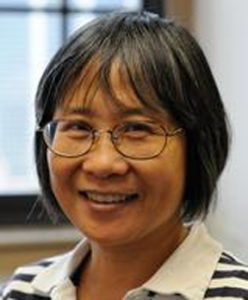by Danielle Fanslow
 Dr. Sui Huang’s role model is Barbara McClintock, the Nobel Laureate who discovered transposable elements. In many ways, the two scientists are alike. Sui, like McClintock, has a fierce love and curiosity for science. She will often run into my lab with a grin on her face exclaiming about the latest piece of data that excites her. Sui is also an innovative scientist. Her ideas spark the imagination and push the limits of how we look at biology. Like McClintock, she is also persistent. Through the climate of tight funding, Sui continues to stay true to her honest pursuit of knowledge. As Sui serves in her current position as Associate Professor in the Cell and Molecular Biology Department at the Northwestern University Feinberg School of Medicine, she continues her joyful search for nuclear structures and functions in cancer cells and beyond.
Dr. Sui Huang’s role model is Barbara McClintock, the Nobel Laureate who discovered transposable elements. In many ways, the two scientists are alike. Sui, like McClintock, has a fierce love and curiosity for science. She will often run into my lab with a grin on her face exclaiming about the latest piece of data that excites her. Sui is also an innovative scientist. Her ideas spark the imagination and push the limits of how we look at biology. Like McClintock, she is also persistent. Through the climate of tight funding, Sui continues to stay true to her honest pursuit of knowledge. As Sui serves in her current position as Associate Professor in the Cell and Molecular Biology Department at the Northwestern University Feinberg School of Medicine, she continues her joyful search for nuclear structures and functions in cancer cells and beyond.
Before Sui began her career in cancer biology research, she was trained to become physician at Fudan Medical School in China. As a medical doctor, Sui felt that she could not help the patients who most needed treatment because of the deficit of biological understanding of many diseases, including cancer. After medical school, Sui decided to change careers and become a cancer researcher. There she could contribute to the biological understanding of cancer and develop treatments that would potentially help more people than she could as a physician. She moved to the United States and got her PhD from Rutgers University. Subsequently, she did a postdoctoral fellowship at Cold Spring Harbor Laboratories, where she focused on studying cancer cells. There she took an innovative approach of searching for unique structural markers of cancer cells, rather than single mutated genes. That’s when she discovered the perinucleolar compartment (PNC), a nuclear body that lies at the periphery of the nucleolus, forming uniquely in metastatic cancer cells.
Sui continues her work to understand the biology of the PNC at Northwestern University. She understands that cancer is a complex disease that requires a complex solution, and that thinking outside of the box can lead to some of the most important and impactful biological discoveries. She and her colleagues found that the PNC could be used as a marker for the metastatic behavior, the major cause of death for cancer. Her team developed a screen for compounds that selectively remove the marker, thus removing or changing the metastatic capable cancer cells with minimal impact on normal cells. Sui is encouraged about the promising anti-metastatic efficacy of her compounds and she hopes to advance them into clinical trials.
Sui is also passionate about giving back to the community. She does quite a bit volunteer work for primary and secondary school science fairs. She also visits classrooms to demonstrate microscopy to children by having them look at their own cheek cells. Additionally, Sui teaches graduate level courses in cell biology and her enthusiasm for science is most evident in her lectures and discussions.
Sui loves science, yet she often feels discouraged by the current system of funding for research. She feels that the most creative and innovative ideas often get overlooked for conventional projects and trendy hypotheses. “I think that people like Barbara McClintock would not be able to survive in today’s system.” She feels that tight funding sometimes favors “people who play the game right, people who follow the rules, rather than follow their science.” She worries that there is little consideration that novel ideas may take longer to develop than the expectation of the funding mechanisms. Gender plays a role in some of the struggles she has faced. She feels women like her, who take low-key ways of explaining their research in meetings and proposals, are sometimes disregarded over male counterparts who present with more showmanship and salesmanship. However, she believes that if scientists of all genders are honest to themselves and committed to their work, over time they could push through the system and achieve their goals.
Throughout her career, Sui’s family motivates her to work harder. Everyday she strives to set an example for her daughter, ensuring her that she can do anything she wants to in life. She will often work alongside her daughter as she does her homework, encouraging hard work by example. Sui’s abundant excitement for her work is contagious to her family, friends and colleagues. She continues to inspire those around her to stay excited and stay positive, even if the science they are pursuing is unconventional and challenging.
